- Monroe One
- O'Connor Academy Handbook
-

O'Connor Academy Handbook
What We Believe
-
Vision (What we strive to be)
We strive to be a community where each moment is used as an opportunity to grow.
-
Mission (What we will do)
We will continuously create a culture of growth and learning by teaching and modeling skills in our core value areas: Mastery, Belonging, and Independence.
-
Core Values (What we believe)
- Mastery
- Success occurs when we skillfully work toward it.
- Challenges are opportunities for growth.
- Belonging
- Restorative Practices connect and strengthen our community.
- Everyone is an accepted and valued member of our community.
- Unique differences and viewpoints strengthen our community and contribute to our learning.
- Independence
- We are responsible for our own choices, actions, learning, and well-being.
-
School-wide Expectations (What we commit to do)
To contribute to a safe and welcoming environment, all students, staff, and visitors will…
- Persist through challenging tasks.
- Use our available resources responsibly.
- Respect each community member.
- Resolve conflict in restorative ways.
- Take responsibility for our choices, actions, learning, and well-being.
Who We Are
-
Communication Flowchart
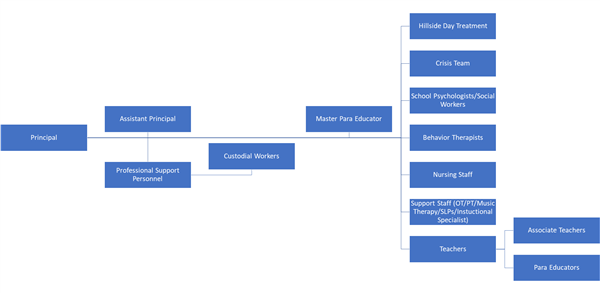
Alternate Text for Communication Flowchart above:
Principal
- Assistant Principal
- Professional Support Personnel
- Custodial Workers
- Custodial Workers
- Master Para Educator
- Hillside Day Treatment
- Crisis Team
- School Psychologists/Social Workers
- Behavior Therapists
- Nursing Staff
- Support Staff (OT/PT/Music Therapy/SLPs/Instuctional Specialist)
- Teachers
- Associate Teachers
- Para Educators
- Assistant Principal
-
Role Definitions
Principal
Responsible for the overall daily activities and operations of OCA.
Assistant Principal
Support the Principal in overseeing the daily activities and operations of OCA.
Professional Support Personnel
Responsible for maintaining and managing essential student and staff information for OCA.
Custodial Workers
Responsible for the upkeep and cleanliness of school grounds.
Master Para Educator
- Mentor and support paraeducators through positive problem-solving strategies.
- Develop and present training and professional learning.
- Assist with hiring and recruitment of paraeducators.
Hillside Day Treatment
- Collaboratively work with team members and students to develop and teach coping/self-regulation skills. Consultation and staff training (including coaching) will be provided to assist with implementation of this component of the BIP.
- Inservice training and staff development on topics that may include (but not limited to) intensive stress management, family systems and dynamics, working with challenging students, therapy techniques, and developing Functional Behavioral Assessments. In addition, support groups for students and caregivers can be provided.
- Communicate with case managers, caregivers, and other team members as needed.
School Psychologists/Social Workers
- Strive to maximize students’ academic and social emotional success in collaboration with families, school staff and community resources. They aspire to a whole person approach that empowers family engagement in the educational lives of the students.
- Communicate with case managers, caregivers, and other team members as needed.
Crisis Team
- Work collaboratively with team members to effectively support all students in program assignments.
- Positively Interact with students and staff consistently.
- Utilize effective preventative/intervention techniques to prevent occurrence, escalation, or re-occurrence of crisis for individual and or groups of students.
Behavior Specialists
- Recording, analyzing, and interpreting student behavior data.
- Developing, implementing, and training other staff on Behavior Intervention Plans (BIP).
- Working collaboratively with staff to provide training and coaching on behavioral techniques in the BIP to best support students.
Restorative Coach
- Coordinate and conduct debriefing sessions of incidents with staff and students.
- Maintain and coordinate ongoing communication and collaboration between educational, mental health, administrative and supportive staff.
- Coach staff in proactive intervention techniques within the classroom and greater learning environment.
Nursing Staff
- Responsible for student medical health and wellbeing.
- NYS mandated services provided include:
- monitoring of physical exam and vaccination status;
- completion of annual vaccination report;
- hearing screening;
- vision screening;
- and scoliosis screening.
- Daily medications, diabetic monitoring, tube feedings and treatments are provided as needed in order for students to be able to attend school.
- Our Registered Nurses also provide training for staff members in emergency response as needed for their students. This includes recognition of diabetic emergencies, seizure activity and severe allergic reactions, and what steps to follow to insure their student's safety.
- Emergency plans are completed for all students with life-threatening medical issues.
- School Nurses also provide first aid, health counseling, and various specialized procedures for medically fragile children. They deal with safety issues and environmental health, as well as developing Individual Health Care Plans as needed for students with complicated medical issues.
- Our nurses serve as the health link for parents, school, physician, and community resources.
Support Staff
Occupational Therapy
Addresses problems in overall sensorimotor development, visual perception, educational and work activities, graphomotor skills, and activities of daily living. The primary focus of occupational therapy is to help students participate as fully as possible in their education, homes and communities.
Physical Therapy
Physical therapy addresses the areas of physical and neurological dysfunction and developmental delays. The physical therapist is concerned with motor and sensory performance. The school-based physical therapist looks at the student's physical functioning and its impact on learning, mobility, accessibility, and safety within the educational environment.
Music Therapy
- A related service under Federal and State Law which can be effectively utilized to help a student meet established Individualized Education Plan (IEP) goals. Through the therapeutic application of singing, playing instruments, moving to music, listening to music and creating music, a student can progress toward meeting established goals and objectives.
- Provides students with the opportunity to develop needed music skills in a therapeutic environment. Since a center-based school is the least restrictive environment for some Monroe One students, music therapy provides the only opportunity to learn the basic skills and concepts usually taught by a music educator. In some instances, the development of non-music and music skills has facilitated a student's integration back into their home school.
Speech Language Pathologists
- This comprehensive service includes the identification, diagnosis, and ongoing evaluation and monitoring of students with speech and language disorders that interfere with communication and educational development. Habilitative and rehabilitative programs are planned, directed and provided to establish or restore communication effectiveness. Services are provided to students in small groups, individually and/or within classroom settings.
- Speech-Language staff are members of educational teams within buildings and programs. As a member of the educational team, they respond to referrals for diagnosis and service, provide information and opinions regarding the educational needs of particular students, and participate in the development of information presented to the Committees on Special Education.
Instructional Specialist
Provide coaching, facilitating, and curriculum development services to staff.
Teachers/Case Managers
- Provide instruction to students.
- Work with assigned Associate Teacher and/or Para Educator.
- Manage all academic needs of homeroom students.
- Communicate with caregivers as needed.
Associate Teachers
Content Based
- Work with assigned classroom Teachers and Para Educators to best support students behaviorally and academically.
- Assume the role of teacher when needed.
- Document student behavioral information in School Tool and communicate with appropriate team members as needed.
Specific Assignment
- Responsible for assigned room/program.
- Document student behavioral information in School Tool and communicate with appropriate team members as needed.
1:1
- Support assigned student in all school settings.
- Document student behavioral information in School Tool and communicate with appropriate team members as needed.
Para Educator
Work with assigned classroom Teachers and Associate Teachers to best support students behaviorally and academically.
-
Other Support Services
The Zone
A safe place for students to go when they feel they cannot be in the classroom. Staff work with students to identify reasons they feel they cannot currently be successful in the classroom and create a plan for re-engagement. If a re-engagement plan cannot be created, then staff communicate with the student’s team so that further support can be provided.
Sensory Room
A therapeutic space that students can access when they are feeling overwhelmed. The room, aptly named “Lifescape”, is equipped with various sensory items such as weighted blankets, alternate chairs, Theraputty, fidgets and more to assist students in self-regulating back to their baseline.
Office of Assisted Technology Services (OATS)
- The Office of Assistive Technology Services (OATS) at Monroe One provides consultation, evaluation, planning, and training in the appropriate use of assistive technology.
- OATS develops individual and organizational plans for the acquisition, use and maintenance of assistive and adaptive devices in special education. It coordinates the expertise of specialists in speech-language pathology, vision, occupational and physical therapy, and educational technology.
- OATS can assist in the evaluation of individual student needs, develop recommendations, and train in the use of assistive technology devices and software.
Such devices and software may include:- specialized software programs and screen magnification software;
- reading and writing supports;
- augmentative and alternative communication devices;
- alternative keyboards, mice, and other input devices;
- and much more!
- In addition, OATS can provide guidance in the development of district assistive technology plans.
English as a New Language (ENL)
- The ENL service (formerly ESOL) provides itinerant instructors in grades K–12 for local school districts and other BOCES programs.
- Certified ESOL teachers provide instruction and support for English language learners. Instruction is designed to develop listening, speaking, reading, and writing skills through meaningful content that is aligned with the Common Core. Co-taught and/or stand-alone instruction is determined by the student's achievement on the NYSITELL or NYSESLAT.
- Design of the service is differentiated according to English proficiency level, age and individual needs and includes selection and adaptation of materials and strategies.
- The program provides supervision of teachers and promotes professional development and peer collaboration among ESOL colleagues.
Deaf Ed, Audiology & Vision Services
- Deaf Education provides students access to curriculum and communication. While the majority of students are deaf or hard of hearing, others may have full access to sound, but require support through the use of sign language.
- Audiology offers a comprehensive support service to students from Kindergarten to 22 years of age. This comprehensive service includes the identification, diagnosis, and ongoing evaluation and monitoring of students with hearing disorders that interfere with communication and educational development. Habilitative and rehabilitative programs are planned, directed, and provided to establish or restore communication effectiveness. Services are provided to students in small groups, individually, and/or within classroom settings.
Audiology staff are members of educational teams within buildings and programs. As a member of the educational team, they respond to referrals for diagnosis and service, provide information and opinions regarding the educational needs of particular students, and participate in the development of information presented to the Committees on Special Education.
- Vision/Orientation and Mobility provides support for students with visual impairments in the areas of academics, orientation and mobility, and functional living skills. Service requests are met for students whose functional vision is impacting their performance. Orientation and Mobility teaches a child to travel safely and efficiently within his/her environment. Tactile and print adaptations of academic and curricular materials enhance the student’s experience with information presented to sighted peers in a comparable manner.
- The Office of Assistive Technology Services (OATS) at Monroe One provides consultation, evaluation, planning, and training in the appropriate use of assistive technology.
-
Committees
One Community
A main committee and subcommittees focused on the Positive Behavioral Interventions and Supports (PBIS) for students within OCA.
Safety
A group of educators who meet to discuss the ongoing safety of students and staff at OCA.
Instructional Support Team (IST)
The committee supports academic success for students at OCA by identifying and supporting tiered intervention services. The members meet to support students in need of academic support through collaboration of the student's team.
Shared Decision Making
A multidisciplinary team that guides educational, vocational, social, and behavioral practices to create a positive school culture and learning environment. Meeting each student's individual needs provides them with the skills to successfully transition into the post-graduate world.
Systems and Structures
-
Restorative Practices
Set of principles and practices focused on fostering healthy relationships through inclusiveness and shared problem-solving. The main belief of restorative practices is that “human beings are happier, more cooperative and productive, and more likely to make positive changes in their behavior when those in positions of authority do things WITH them, rather than TO them or FOR them.” This belief maintains that the punitive, authoritarian, permissive, and paternalistic modes are not as effective as the restorative mode (Wachtel, 2005).
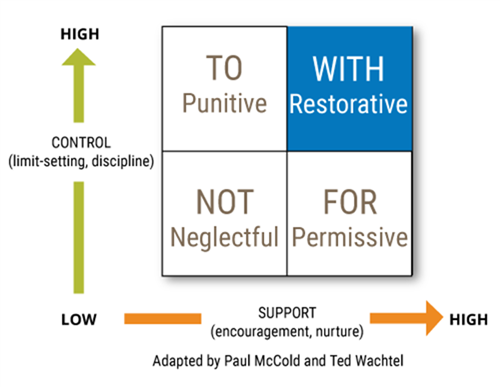
Alternative text for chart above:
- Low Support (encouragement, nurture) and
Low Control (limit-setting, discipline) equals:
NOT
Neglectful - Low Support (encouragement, nurture) and
High Control (limit-setting, discipline) equals:
TO
Punitive - High Support (encouragement, nurture) and
Low Control (limit-setting, discipline) equals:
FOR
Permissive - High Support (encouragement, nurture) and
High Control (limit-setting, discipline) equals:
WITH
Restorative
(Adapted by Paul McCold and Ted Wachtel)
Strategies used to build positive relationships:
- Shared Mission and Vision
- School-wide Expectations
- Social-Emotional Curriculum and Instruction
- Community-Building Circles
- Collaborative Classroom Agreements
- Check-in/Check out
- PEER Student Mentoring
- Academic Circles
Restorative Discipline
A whole-school, relational approach to building school climate and addressing student behavior that fosters belonging over exclusion, social engagement over control, and meaningful accountability over punishment.
Strategies used to repair harm and restore relationships:
- The Zone
- Pre-Conferencing
- Mediation
- Restorative Circles
Outcomes
The use of Restorative Practices (including Restorative Discipline) helps to:
- reduce crime, violence, and bullying
- improve human behavior
- strengthen civil society
- provide effective leadership
- restore relationships
- repair harm
Student Behavior Flow Chart
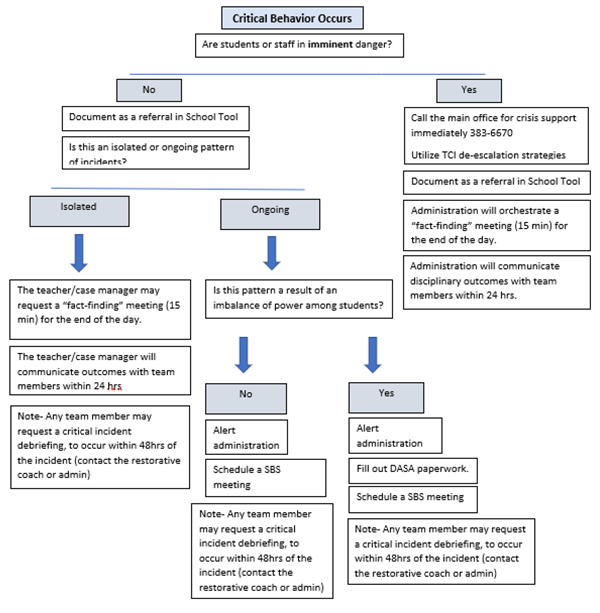
Alternative text for Student Behavior Flow Chart above:
Critical Behavior Occurs.
Are students or staff in imminent danger?If Yes, imminent danger:
- Call the main office for crisis support immediately: 383-6670.
Utilize TCI de-escalation strategies. - Document as a referral in School Tool.
- Administration will orchestrate a "fact-finding" meeting (15 minutes) for the end of the day.
- Administration will communicate disciplinary outcomes with team members within 24 hours.
If No imminent danger:
- Document as a referral in School Tool.
- Is this an isolated or ongoing pattern of incidents?
- If Isolated:
- The teacher/case manager may request a "fact-finding" meeting (15 minutes) for the end of the day.
- The teacher/case manager will communicate outcomes with team members within 24 hours.
- Note - Any team member may request a critical incident debriefing, to occur within 48 hours of the incident (contact the restorative coach or admin).
- If Ongoing:
Is this pattern a result of an imbalance of power among students?
- If No:
- Alert administration
- Schedule a SBS meeting
- Note - Any team member may request a critical incident debriefing, to occur within 48 hours of the incident (contact the resotrative coach or admin).
- If Yes:
- Alert administration
- Fill out DASA paperwork
- Schedule a SBS meeting
- Note - Any team member may request a critical incident debriefing, to occur within 48 hours of the incident (contact the restorative coach or admin)
- If No:
- If Isolated:
- Low Support (encouragement, nurture) and
-
Student-Based Solutions (SBS)
Student-Based Solutions (SBS) Meetings are student- and data-focused meetings meant to analyze a student’s current level of success and to plan support or intervention if necessary. SBS meetings can be held for either behavioral or academic purposes.
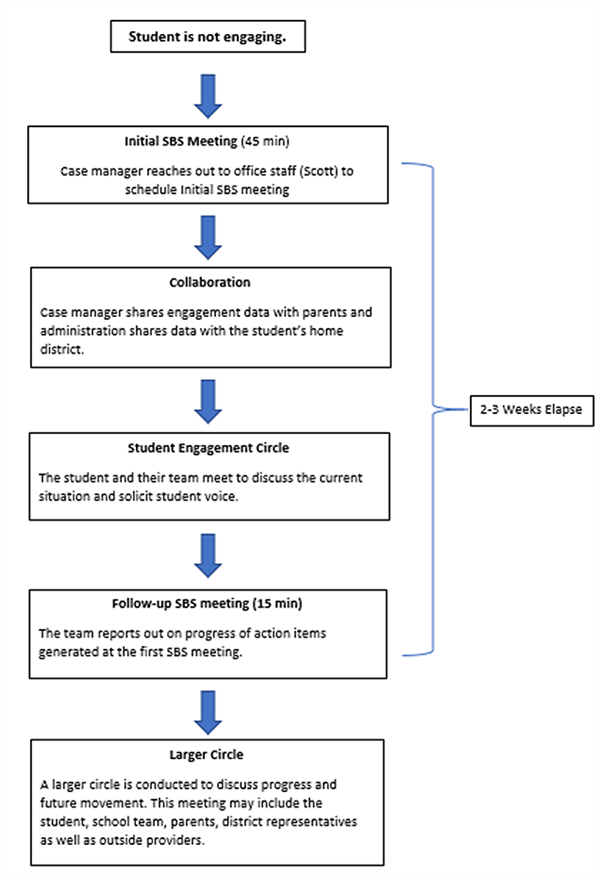
Alternate text for SBS Meetings Graphic above:
- Student is not engaging.
- Initial SBS Meeting (45 minutes)
Case manager reaches out to office staff (Scott) to schedule initial SBS meeting. - Collaboration
Case manager shares engagement data with parents and administration shares data with the student's home district. - Student Engagement Circle
The student and their team meet to discuss the current situation and solicit student voice. - Follow-up SBS Meeting (15 minutes)
The team reports out on progress of action items generated at the first SBS meeting.
(Note: 2–3 Weeks Elapse between Initial SBS Meeting and Follow-up SBS Meeting) - Larger Circle
A larger circle is conducted to discuss progress and future movement. This meeting may include the student, school team, parents, district representatives as well as outside providers.
- Student is not engaging.
-
Standards-Based Instruction and Grading
Standards-Based Instruction (SBI)
Standards-Based Instruction (SBI) is a teaching method that is based on standards of skill mastery. It focuses on what students understand and what they can do with that understanding. This differs from traditional instruction, which is often task-based, leading to teaching based on productivity rather than comprehension and ability.
Each content area, including social-emotional learning, is aligned to a set of NYS learning standards. Curriculum is created based on the standards, then lessons are created based on the units in the curriculum. Some guidelines for SBI include:
- Teachers provide clear learning targets that are based on standards.
- Students have multiple opportunities to meet the learning target.
- Students set goals and monitor their own progress.
- Teachers provide specific feedback to students about assignments or progress.
- Students have multiple opportunities for revision of work.
- Students may receive an “Incomplete” for a course.
Standards-based grading (SBG)
Standards-based grading (SBG) is an intentional way for teachers to track their students’ progress and achievements while focusing on helping students learn and reach their highest potential. It is based on students showing signs of mastery or understanding various lessons and skills. Teachers will typically use a 4-point proficiency scale or rubric for grading.
Sample proficiency scale:
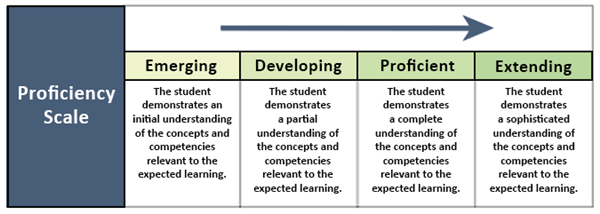
Alternate text for Sample Proficiency Scale Graphic above:
Proficiency Scale
- Emerging:
The student demontrates an initial understanding of the concepts and competencies relevant to the expected learning. - Developing:
The student demontrates a partial understanding of the concepts and competencies relevant to the expected learning. - Proficient:
The student demontrates a complete understanding of the concepts and competencies relevant to the expected learning. - Extending:
The student demontrates a sophisticated understanding of the concepts and competencies relevant to the expected learning.
The purpose of standards-based grading is to give a clearer picture of a student’s learning progress. Instead of a traditional points gradebook where you see a single letter grade, an SBG report card gives a detailed view of student strengths and weaknesses. Traditional grading communicates on a broad level, whereas standards-based grading provides detailed and actionable insights.
-
Positive Behavioral Interventions and Supports (PBIS)
Positive behavioral interventions and supports (PBIS) is an approach schools use to promote school safety and good behavior. With PBIS, schools teach kids about behavior expectations and strategies. The focus of PBIS is prevention, not punishment. (Understood.org)
OCA Tiers of Positive Behavioral Support
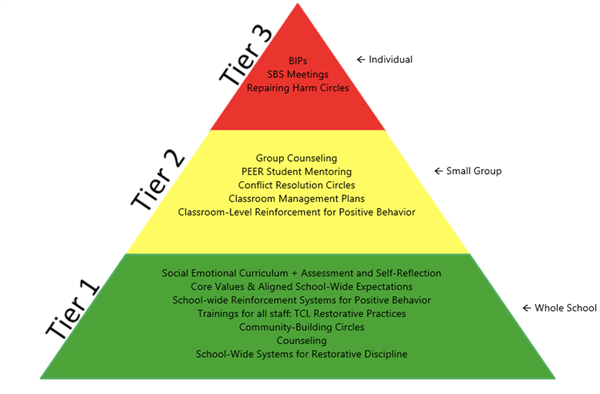
Alternative text for OCA Tiers of Positive Behavioral Support Graphic above:Tier 1 (Whole School):
- Social Emotional Curriculum + Assessment and Self-Reflection
- Core Values & Aligned School-wide Expectations
- School-wide Reinforcement Systems for Positive Behavior
- Trainings for all staff: TCI Restorative Practices
- Community-Building Circles
- Counseling
- School-wide Systems for Restorative Discipline
Tier 2 (Small Group):
- Group Counseling
- PEER Student Mentoring
- Conflict Resolution Circles
- Classroom Management Plans
- Classroom-Level Reinforcement for Positive Behavior
Tier 3 (Individual)
- BIPs
- SBS Meetings
- Repairing Harm Circles
Clubs
We offer a variety of weekly clubs for students based on their interests. This provides opportunities for small group positive interactions and relationship-building.
Weekly Incentives
Each week, students have the opportunity to earn a preferred activity based on their daily demonstration of social-emotional skills. On Thursdays, students review their skill data with staff and select one of the incentive choices to participate in on Fridays. There are four levels of choices. Everyone earns an incentive, but the level depends on their success in demonstrating positive social-emotional skills throughout the week.
PEER (Peer Educators Enhancing Relationships)
A student mentoring program in which upper-level students mentor incoming 9th graders. The group gets together monthly to engage in community building activities that enhance the positive culture at our school. They focus on attitudes and skills aligned to our core values.
Additional Events
We have many events that support a positive school culture and positive relationships. Some of these include:
- Student of the Month
- Holiday celebrations
- School-wide games
- Prom
Academics and Technology
-
Academics and Technology
O'Connor Academy (OCA) is a structured, Special Education (6:1:1) High School program of students in grades 9–12. We provide students with all necessary requirements to achieve a NYS Regents or Local diploma and/or CDOS credential. A NYS Regents diploma requires students to receive 22 units of credit including: ELA (4 credits), Social Studies (4 credits), Science (4 credits), Math (3 credits), Health (1/2 credit), Art (1 credit), PE (2 credits), Electives (3 ½ credits), LOTE (1 credit) *if exempt, still need an elective credit. OCA provides opportunities for students to reach multiple pathways to graduation in collaboration with staff, students, families, and the CSE team.
-
Academic Schedule
-
Monroe One Yearly Calendar
-
Academic Courses and Electives
-
Program Opportunities
Multi-Occupational and FOCUS Programs (MOF)
The Multi-Occupational and FOCUS (MOF) programs introduce students with varying learning needs to career and technical education. Students have the opportunity to develop skills for success in work and life after high school.
Eastern Monroe Career Center (EMCC)
Eastern Monroe Career Center (EMCC) offers programs that provide high school students the opportunity to develop the skills necessary for success in their chosen careers. EMCC combines real-life learning experiences, academic skills, and business and industry partnerships to prepare our graduates for future education and employment endeavors.
Extended School Year (ESY)The Extended School Year (ESY) is an opportunity for students to stay engaged in academic and social-emotional learning for six weeks during July and August.
-
Report Cards
SchoolTool™
SchoolTool™ is an application that maintains student information. The student and parent portals allow for access to the following information:
- Class schedule
- Attendance record
- Grades
- Assessments
Contact O’Connor Academy for support with SchoolTool™: (585) 383-6670
Progress reportsStudents and families receive a digital report detailing current grades every five weeks. This allows them to track progress and identify areas of concern.
Quarter reportsStudents and families receive written and digital reports with current grades for the quarter every 10 weeks. This allows them to track progress toward receiving course credit.
-
Technology
Microsoft 365
Microsoft 365 is a tool used by Monroe One staff and students. Class materials can be accessed through Microsoft Teams, a communications platform under the Microsoft 365 umbrella. Students have access when they sign in to their BOCES account.
The Monroe One help desk is available to assist staff with technology needs. Students and parents can work with program staff to initiate technology support.
ParentSquare
ParentSquare is our primary communication platform at Monroe One BOCES. It is a safe, easy way to receive information from principals, teachers, and staff. You will need to create an account with Monroe One even if your home district already uses ParentSquare.
Monroe One uses ParentSquare to:
- Send emergency alerts
- Send messages via email, text, or app notification
- Post school information, highlights, and photos
- Create fillable forms and permission slips
- Communicate in families’ preferred language
- Maintain school calendars
- Send and receive school and class information
SchoolTool™
View SchoolTool™ overview (opens in new window).
Policies and Procedures
-
Confidentiality
OCA complies with all Federal (FERPA) and local laws regarding student confidentiality including Education Law 2-D.
- Do not discuss a student with anyone who is not directly involved with the student.
- Do not discuss a student outside of work.
- Do not discuss a student in front of the student (or their peers).
- Do not discuss a student on the radio/walkie-talkie.
- Student documentation is shared only with the student's primary team and individuals with written consent.
- No identifying information, including photographs, will be shared on personal social media.
- Monroe One may display pictures or stories of programs and/or students through social media platforms. Families have the right to opt out of having their student's information and/or photos on Monroe One's webpage or social media sites.
-
School-Based and Personal Electronic Devices
School-provided and personal electronic devices shall be used in accordance with the Code of Conduct and O'Connor Academy's school-wide expectations.
- Personal electronic devices, such as cell phones, iPads, and speakers, are allowed at the staff's discretion.
- Students who use an electronic device to disrupt the educational process, violate the Code of Conduct, violate an individual's personal rights, or cyberbully will be subject to progressive discipline and may be subject to legal involvement. This includes, but is not limited to, recording students without permission, sharing of photos or videos on social media without permission, sharing of inappropriate material, making threatening statements, or using statements that discredit an individual's character.
- Personal electronic devices, such as cell phones, iPads, and speakers, are allowed at the staff's discretion.
-
Dignity for All Students Act (DASA)
The Dignity for All Students Act (DASA) seeks to provide students with a safe and supportive environment free from discrimination, intimidation, taunting, harassment, and bullying on school property.
Behaviors occurring off school property and on the bus may be considered for a DASA referral if they impact students' sense of safety and support within the school environment.
DASA Coordinators for OCA- Darrin McCormick, Assistant Principal
585-249-7252
- Darrin McCormick, Assistant Principal
-
Dress Code
O'Connor Academy will follow the Monroe One Code of Conduct, including the dress code. Students will be encouraged to comply with the guidelines and appropriate clothing will be made available.
The Monroe One Code of Conduct states:
All students are expected to give proper attention to personal cleanliness and to dress appropriately for school and school functions. Students and their parents/guardians have the primary responsibility for acceptable student dress and appearance. Teachers and all other school personnel should exemplify and reinforce acceptable student dress and help students develop an understanding of appropriate appearance in the school setting.
A student’s dress, grooming and appearance, including hair style/color, jewelry, make-up and nails, shall:
-
- Be safe, appropriate, and not disrupt or interfere with the educational process;
- Recognize that extremely brief garments and see-through garments are not appropriate;
- Include footwear at all times, and footwear that is a safety hazard will not be allowed;
- Not include items that are vulgar, obscene, and libelous or denigrate others on account of race, color, religion, creed, national origin, gender, sexual orientation, or disability;
- Not promote and/or endorse the use of alcohol, tobacco, or illegal drugs and/ or encourage other illegal or violent activities; and
- Adhere to safety requirements in special instructional settings (i.e., shop safety requirements regarding clothing).
- Be safe, appropriate, and not disrupt or interfere with the educational process;
Nothing in this policy shall be construed to limit the ability of students to wear clothing that allows them to express their gender identity, or to discipline students for doing so.
Each building/program administrator shall be responsible for informing all students and their parents of the student dress code at the beginning of the school year and any revisions to the dress code made during the school year.
Students who violate the student dress code will be encouraged to comply with the guidelines. Any student who refuses to do so may be subject to discipline, up to and including in-school suspension for the day. Any student who repeatedly fails to comply with the dress code and continues to refuse to cooperate after the implementation of restorative justice principles shall be subject to further discipline, up to and including out-of-school suspension.
-
-
Laptop Policy
Laptops are assigned for individual student use and should be left at school. Laptops should only go home in certain circumstances with administrator permission. It is an expectation that laptops are to be used appropriately.
-
Student Acceptable Use Policy
-
Food Services
Breakfast and Lunch are available each day at no charge to all O’Connor students. There will be a charge for à la carte items. Lunch needs to be ordered with your homeroom teacher at the beginning of the day. All food needs to be eaten in the cafeteria or designated locations.
Learn more about Food Services: O'Connor Academy (opens in new window).
-
Busing
Busing is determined by the student’s home district. Districts determine when to provide buses if school calendars differ. Busing changes need to be requested through the district and may take up to 10 days to process.
-
Monroe One Policies and Regulations
-
Safety and Security
Security is everyone’s responsibility, so exercise situational awareness at all times. If anything appears suspicious, unsafe, or illegal, report it! “If you see something, say something.”
- Take action to protect yourself and others based on professional judgment and relevant training, such as “Therapeutic Crisis Intervention.”
- DO NOT open doors to unknown individuals or visitors. Direct those individuals to go to main entrance to be allowed in. If unsecured doors are observed, close them.
- All staff are required to wear their ID badges while at work, and all staff vehicles must be registered with the safety and security office. Permits are available in the Safety and Security Office, Building 7, on the Central Campus.
- Automated External Defibrillators (AED) are in place at all BOCES facilities and all school districts. It is critical that all trained and untrained staff members are fully aware of AED locations, and that they know who to call to get an AED to a location as quickly as possible.
- Take action to protect yourself and others based on professional judgment and relevant training, such as “Therapeutic Crisis Intervention.”
-
Emergency Procedures
View Emergency Planning webpage (opens in new window).
- Fire Drills
Teachers and classroom paras are responsible for bringing their class roster and fire drill folder with them as they evacuate, and for communicating student locations with administration. Folders should be kept in a prominent location and contain a red and green card. All exit plans are located next to the door. - Lock Down and other Drills
Drills will be practiced and called out over the building intercom. All staff are expected to know their roles in emergency situations. Be familiar with the school safety plan and activities of the school safety team. - School Safety Plans
Safety plans are found on our website as well as in the school safety plan manual in the classroom.
- Fire Drills
-
Building Entry Search Protocols
All students entering the building will go through a search/screening process by our security department on a weekly basis on random days. The following protocols are used upon student entry to the building:
- Student bags and backpacks will be subjected to a visual search, and students are scanned with a handheld metal detector.
- Students who refuse search will not be allowed in the building and decisions will be made about transporting home.
- Items in violation of the Code of Conduct will be confiscated including but not limited to tobacco and vaping materials, lighters, drugs, and weapons. Any items deemed criminal will be given to the School Resource Officer.
- Per our regular search protocols in accordance with the state and federal laws, students will be searched during the day when there is a reasonable suspicion that they have illegal items in their possession or if they are in violation of the Code of Conduct.
- Student bags and backpacks will be subjected to a visual search, and students are scanned with a handheld metal detector.
-
Staff Evaluation/APPR Overviews
Evaluation procedures are differentiated by employee bargaining unit and can be found on our website. Contact your Assistant Principal if you need help or have questions.
-
Parent Communication
- Main Office: 585-383-6670
- SchoolTool™: View SchoolTool™ overview (opens in new window).
- ParentSquare:
ParentSquare is designed to give you a safe, easy way to get information from principals, teachers, and staff. Learn more about ParentSquare (webpage opens in new window).
- Main Office: 585-383-6670
-
Staff Communication
Monroe One BOCES communicates information by email. All employees are required to check their email often.
- Monroe One Code of Conduct:
monroe.edu/CodeOfConduct
- Monroe One Code of Conduct:
Q & A for Parents
-
Are there sports?
Students should seek eligibility for sports teams through their home district.
-
Are there any clubs students can join?
Yes, we offer clubs. If there is a particular club we do not offer, or the student wishes to join a club from their home district, please contact them directly.
-
Where can I obtain my student’s transcript?
Transcripts are available through your student’s home district.
-
Is there Driver’s Ed available?
For information regarding Driver’s Education, please contact your home district.
-
My child has their driver’s license; can they drive to school?
Questions should be directed to the program administrator (principal) at the school.
-
Is there a school supplies list for my student for their classes?
Our department clerical staff will be able to order any supplies you require. Students are not required to bring their own supplies; they will be supplied by the classroom teacher for each class.
-
My child has a food allergy how do I let the school know?
Call the main office at 383-6670 and ask for the school nurse at extension: 7251.
-
If my student is suspended off the bus, how would they get to school?
It would be the parent/caregiver's responsibility to transport them until they can return to their bus schedule.
-
Do you have LGBTQ+ bathrooms?
Yes, we do.
-
Do you offer a school prom?
Yes, we do. Students are allowed to attend their district school dances. Please reach out to their district for more information.
-
Do you have an open house?
Yes, please refer to our school calendar and or school website for date and time.
-
My student is a senior; will there be a graduation?
Yes, we do hold a graduation ceremony. For information on attending their home district graduation, please contact the home district directly.
Q & A for Staff
-
Where can we go for support with instructional materials, curriculum planning, technology, and pedagogical ideas/coaching?
Staff should go to the Instructional Specialist.
-
Do we have a library?
We do not have a library, but resources are available.
-
How do I find supplies for classroom and supplies for students (what do they bring in)?
Our department clerical staff will be able to order any supplies you require. Students are not required to bring their own supplies; they will be supplied by the classroom teacher for each class.
-
Who do I go to for help with technology?
The Help Desk with Campus Tech is set up to assist staff with technology needs. Contact information can be found in the Staff Zone on monroe.edu.
-
Is there a way I can print posters or get something laminated?
Yes, the Imaging Center can help you with that.
-
How do I print in color?
Ask the clerical staff for assistance for any printing.
-
Who do I need to contact if I have a question regarding a student I may be working with?
Go to the student’s case manager (homeroom teacher).
-
What do I need to do if I need to take time off?
Write your name in the book located in the main office and fill out the appropriate forms located on our website. Questions can be directed to clerical in the main office or Human Resources.
-
Where do we eat and store our lunches?
We have a staff lounge off the copy room (C3). Refrigerators are available for staff to use along with microwaves, the toaster, and a KEURIG.

